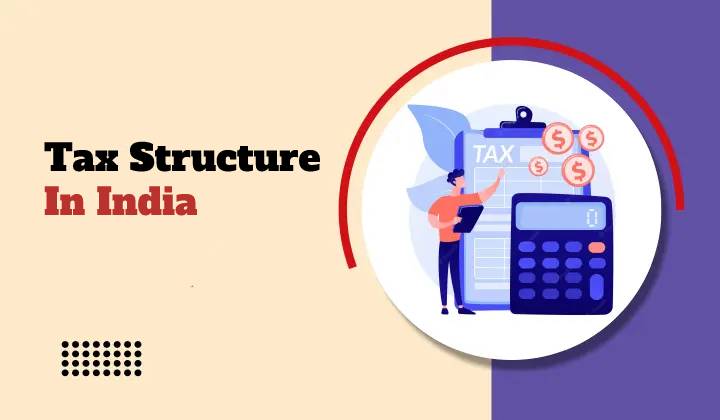Tax Structure In India: Learn Indian Tax System & Taxation in India

All about MSME Registration: Inside Tax Experts
November 30, 2022
How much can you spend with a Credit Card without attracting Income Tax scrutiny?
December 11, 2022All About Tax Structure In India
Taxes are an important and largest source of income for the government. The government uses the money collected from taxes for various projects for the development of the nation. The Indian tax system is well structured and has a three-tier federal structure.
The tax structure consists of the central government, state governments, and local municipal bodies. When it comes to taxes, there are two types of taxes in India – Direct and Indirect tax. The direct tax includes income tax, gift tax, capital gain tax, etc while indirect tax includes value-added tax, service tax, Good and Service tax, customs duty, etc.
The Central Government of India imposes taxes such as customs duty, central excise duty, income tax, and service tax. The state governments impose income tax on agricultural income, state excise duty, professional tax, land revenue and stamp duty. The local bodies are allowed to collect octroi, property tax, and other taxes on various services like water and drainage supply.
Types of Taxes in India
Taxation in India is majorly divided into Central and State Govt taxes with two types of taxes:
- Direct Taxes
- Indirect Taxes
While direct taxes are levied on your earnings in India, indirect taxes are levied on expenses. The responsibility to deposit the direct tax liability lies with the earning party, whether individual, HUF or a company.
Indirect taxes are collected majorly by the corporates and businesses providing services and products. Thus, the responsibility to deposit indirect taxes lies with these entities.
What is Direct Tax?
Direct taxes are imposed on corporate entities and individuals. These taxes cannot be transferred to others. For individual taxpayers like you, the most important type of Direct tax is the income tax. This tax is levied during each assessment year (1st April to 31st March). As per the Income Tax Act, 1961, it is mandatory for you to make income tax payments if your annual income is above the minimum exemption limit. You can get tax benefits under various sections of the Act. Before we talk about tax benefits, it is important for you to understand the income tax slab.
What are the Different Types of Direct Tax?
Direct taxes account for almost 50% of the government’s revenue in India. However, income tax is not the only direct tax. Here are the types of direct taxes applicable in India:
- Income Tax
- Capital Gains Tax
- Corporate Tax
Income tax applies to any income of an Individual and HUF except capital gains and profits from business and profession. Income tax is calculated as per the applicable slab rates for the Assessment Year.
The central government announces the slab rates in the annual budget.
You also have the provision to reduce your taxable income using the tax-saving investments and expenses under section 80C.
What other Taxes come under Direct Tax?
Individuals in India, earn an income in a diverse range. Therefore, it is important to levy a tax on you based on your income and if someone earns more, the tax percentage should be different. The Income Tax Act segregates the income range and charges different rates as per the segregation. The different groups are known as tax slabs. Your income tax slab can vary not only based on your income but also your age. Every year during the Central Government’s Budget Session, amendments are made in the income-tax slabs.
1. Capital Gains Tax
Capital gains tax apply to the profits from the sale of a capital asset only. The rate of tax on capital gains depends on the type of capital gain. Income Tax Act, 1961 divides the capital gains tax into the following two types:
Short-Term Capital Gains Tax
Long-Term Capital Gains Tax
Short-term capital gains are when the assets are sold within a specified period, for example:
- Equity stocks sold within 12 months of purchase
- Debt mutual fund units sold within 36 months of purchase
- Real estate property or gold sold within 36 months of purchase
If the asset is sold after the specified period, the gains or losses will become long-term capital gain or loss.
Depending on the type of asset your gain may receive indexation benefit on long-term capital gains. Indexation allows you the benefit of inflation to your capital gains, reducing your tax liability.
2. Corporate Tax
The corporate tax applies to the businesses and entities filing their returns as a company. This is also a slab rate depending on the turnover of the firm.
What are the Different Types of Indirect Taxes in India?
Indirect taxes in India have been the most consistent and largest revenue source for the government. The Indian tax system has had multiple indirect taxes, some of these are still operational:
- Service Tax
- Indian Excise Duty
- Value Added Tax (VAT)
- Customs Duty
- Securities Transaction Tax (STT)
- Stamp Duty
- Entertainment Tax
Few of the indirect taxes in India like service tax, value-added tax and excise duty have been removed for a large number of goods and services. These taxes have been replaced by a single Goods and Services Tax.
Customs duty tax applies to the goods being imported into India from other countries, and in a few cases on the goods being exported from India.
Securities Transaction Tax or STT applies to the transactions involving an exchange of financial securities. For example, equity stocks, mutual fund units, future and options contracts. This tax is necessarily applied to securities exchange transactions. However, you can also pay Stamp duty and STT on securities changing hands outside the exchange or over the counter.
STT allows the buyers and sellers of securities to benefit from lower short and long-term capital gains taxes on the exchange.
Stamp duty is a State Government levy on the transfer of assets within their territory. It acts as legal proof of ownership of the asset or security.
Entertainment tax in India is also a state subject and applies to the transactions involving the entertainment business in the country. Such businesses and activities will include movie releases, sporting events, concerts, amusement parks, theaters, etc.
What is Goods and Services Tax?
Goods and Services Tax or GST has been a consolidation of a complex web of indirect taxes in India. Taxation in India can have three layers of levies – Centre, State and Local Authority or Municipalities.
Before GST introduction in the Indian taxation system, the following indirect taxes could apply to the goods and services in India:
- Excise Duty
- Entertainment Tax
- Value Added Tax (VAT, State)
- Octroi
- Service Tax
- Central Sales Tax (collected by State)
- Purchase Tax
- Entry Tax (State)
- Luxury Tax (State)
These interconnecting and often overlapping taxes posed many disadvantages and conflicts for suppliers and manufacturers along with the government bodies.
Disadvantages of Indirect Taxes before GST
- A complex web of multiple tax points and returns for suppliers
- Incidents of double taxation and cascading effect
- Difficult web legal conditions for exporters
- The difficulty of market entry due to varying rules and regulations
- Very high after-tax prices for goods and services
The introduction of GST was to remove the complexity and hurdles towards participation in nationwide markets for businesses. For the individuals and end consumers, GST made the goods and services cheaper, while making taxation transparent and easy for sellers.
Want Better Understanding?
Get in touch with inside tax experts. The most reliable tax filing and legal services providers in Delhi. You can discuss your concerns and queries regarding income tax returns, GST filing, legalization, trade market services, registration services and more. The Inside Tax Consultants have 10+ years of experience with qualified CAs and staff. Trusted by 5000+ clients from 100+ companies and national-level businesses.
Contact our knowledgeable staff today!




